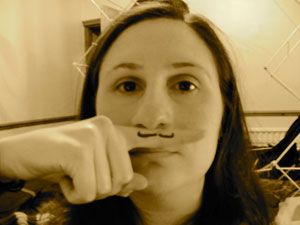by Sarah Beth Nelson
 When I was working in the children’s area of a public library there were two sisters who befriended me and who came to the library once or twice a week. One day, when only the older girl was there we started telling silly jokes. Here is one of the jokes I told her:
When I was working in the children’s area of a public library there were two sisters who befriended me and who came to the library once or twice a week. One day, when only the older girl was there we started telling silly jokes. Here is one of the jokes I told her:
A duck walks into a bar and asks the bartender, “Do you have any duck food?”
The bartender says, “No.”
The next day, the duck walks into the bar and asks the bartender, “Do you have any duck food?”
The bartender says, “No.”
The next day, the duck walks into the bar again and asks the bartender, “Do you have any duck food?”
The bartender says, “No, I don’t have any duck food, and if you ask me again, I’m going to nail your little webbed feet to the bar.”
The next day, the duck walks into the bar and asks the bartender, “Do you have any nails?”
The bartender says, “No.”
“Good,” says the duck, “Do you have any duck food?”
A few days later, both the girl and her younger sister were at the library. The older girl decided to tell my joke to her sister. This is how she told it:
A duck walks into a barn and asks the farmer, “Do you have any duck food?”
Etc… (Emphasis mine.)
An adult hears the original joke I told and is immediately reminded of other “bar jokes,” like this one:
C, E flat, and G walk into a bar. The bartender says “We don’t serve minors.”
So, E flat leaves and C and G share a fifth.
Adults are quite familiar with the formula: X walks into a bar and Y funny thing happens. But, the “bar joke” context doesn’t exist for a child, so it is easily forgettable. My friend remembered the punchline and set the joke somewhere that made more sense to her – on a farm.
I got excited about this whole incident because this is how the oral tradition works. As stories (and jokes are just short stories) are passed on by word of mouth, some things stay the same and some things change. It is easy to think that this doesn’t happen anymore with so many ways to permanently fix a story in a medium: print, video, audio, etc. But in little ways the oral tradition is still functioning the way it always did. People still tell stories and the stories change to suit the times and the audience. The details that happen to stay the same…we know those are the things that are worth remembering.
About Sarah Beth
“Vox Fabularum” means “the voice of the stories.” This is how Sarah Beth thinks of herself as a storyteller. Stories only exist as long as there are people who are willing to tell them and people who are willing to listen. Sarah Beth pulls tales out of the aether, breathes life into them, and sends them on their way. The stories she shares will find a home in your ears and in your hearts.
Sarah Beth’s stories are informed by her studies of classical mythology and history, her strong love of the oral tradition, and of course, the adventures in her own life.
Contact Sarah Beth
Website: voxfabularum.com
Email:
Phone: 770-871-8533
